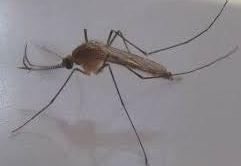U of I Computer Model Forecasts West Nile Virus Infection

A culex mosquito, a genus of mosquito that carries West Nile Virus in Illinois. Ton Rulkens / Flickr
Researchers at the University of Illinois have come up with a computer model to forecast the human infection rate for the mosquito-borne West Nile Virus. Research climatologist Nancy Westcott with the U of I’s Midwestern Regional Climate Center, says the model forecasts weather conditions that are most likely to encourage the growth of the culex genus of mosquito, which carries the West Nile Virus in Illinois.
Research climatologist Nancy Westcott with the U of I’s Midwestern Regional Climate Center, says the model forecasts weather conditions that are most likely to encourage the growth of the culex genus of mosquito, which carries the West Nile Virus in Illinois. Culex mosquitoes are most numerous in warm weather that’s not too wet, because heavy rains disrupt mosquito habitats.
Westcott says the computer model analyzes long-term and short-term weather patterns, in order to predict the mosquito population and subsequent human infection rate for the coming week. The model breaks Illinois into regions, called climate divisions. Climate Division Five covers eastern Illinois, from Kankakee south of Champaign-Urbana and Danville. A graph for the region predicts an above-average level of West Nile Virus human infection for the next several days.
“So for this year, just in the past week or two, the mosquito infection rate has been increasing,” said Westcott of the model’s analysis of Climate Division Five. “So from now on, for this year, we can expect there to be more West Nile Virus.”
Westcott says an earlier application of the forecasting model to DuPage County showed a good degree of accuracy, and provided forecasts more quickly than previous methods of prediction.
The approach used in the computer models was developed by Marilyn O’Hara Ruis, director of the Geographic Information Systems and Spatial Epidemiology Laboratory at the U of I College of Veterinary Medicine, along with Lindsay Shand, a graduate student in statistics.
A statewide version of the model has just gone online. Westcott says local health departments and mosquito abatement districts can use the model to issue public warnings --- and the general public can use it as well.
Links
- Mindful Parenting; West Nile In Illinois; ‘Flyover Country’ App For Science Info About Your Flight
- 2 Illinois Women Die From West Nile Virus
- 1st West Nile Virus Death Reported In Illinois
- More Than 20 Macon County Mosquito Batches Test Positive for West Nile
- West Nile Virus Infects Mosquitos In Macon County
- Macon County Detects West Nile Virus
- Mosquitoes Test Positive for West Nile Virus in Champaign, Macon Counties
- West Nile Virus Makes its Summer Appearance in Champaign County
- West Nile: Another Tough Season
- Mosquito Infection Rate Prediction Model
